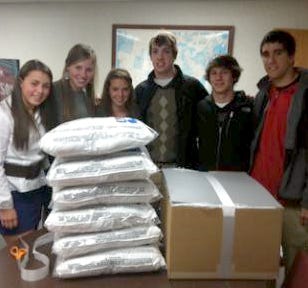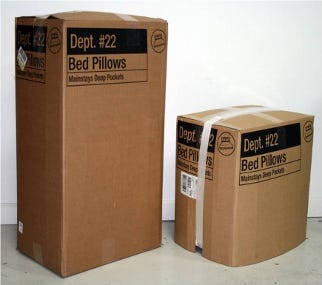March 11, 2015
Packaging Digest additions to this article based on e-mail communication with Andrew Barrieau at Felins USA include the images, as well as these two quotes:
"The savings for this idea are estimated to be $3 million per year for the mainstays deep pocket bed pillow alone."
— Andrew Barrieau, president/CEO of Felins USA
"It's been great to work with this fine group of dedicated young people. They went out and uncovered a need, developed a more sustainable solution, and found a way to get their idea in front of the right audience at Walmart. The local store team provided a lot of great help, and from the minute I saw their presentation, I knew that they were onto something exciting."
— Ronald Sasine, senior director of packaging, Walmart.

Students pillow pkg
By Marissa Evans, Milwaukee Journal Sentinel
May 19—For six Homestead High School seniors, one of the first assignments for their product development class in September was to go shopping at Sam's Club.
They weren't strolling the aisles looking at stuffed animals and light bulbs for themselves but rather at the boxes they were packaged in.
The students zeroed in on how the store packaged its pillows.
After talking with store managers about their struggles to stock and work with the large boxes, the students knew they had their project, and what turned out to be a potential $300 million money-saver.
Lindsay Berman, Aly Coran, Sam Enea, Rebecca Hart, Cole Reichertz and Peter Schwalbach have spent the last nine months working with the Milwaukee-based sustainable packaging solutions company Felins USA to create more environmentally savvy and cost-efficient packaging for Wal-Mart Stores' MainStays bed pillows and its pillow supplier Springs Global.

Students pillow pkg 15 per box
After many trials and errors—and beat-up pillows—the students, aided by Felins, found a solution to packaging them: a machine that will compress pillows in a box with a special band, making it possible to use smaller boxes.
Currently, the boxes Wal-Mart uses come into stores standing 40 inches tall. The students' prototype would shrink the box size to just 26 inches.
"The students' packaging prototype has the potential to reduce packaging costs for bed pillows by more than 40 percent and eliminate more than 800 trucks from highways each year," said Andrew Barrieau, president and CEO of Felins USA, who mentored the students.
The possibilities piqued interest from Wal-Mart corporate officials, and earlier this month the students and Felins presented their work during Wal-Mart's Sustainable Packaging Expo at its headquarters in Bentonville, Ark. The three-day expo focused on environmentally responsible packaging alternatives and brought together more than 250 industry suppliers and packaging experts worldwide.
Of the seven main session presentations, the team from the Mequon high school was the only student group represented.
"Looking back at where we started, there were a lot of times we were discouraged, especially after the trial-and-error tests and thinking that nothing was going to work," said Hart, 18. "It's remarkable where we are now. We're proud and satisfied at this point. There hasn't been any other group in our class to really get this far."
Business class
The product development class is part of Homestead's business curriculum and is a capstone course for seniors. Each year nearly 100 students apply and only 25 to 30 are accepted.
Students break into small groups, with each group paired with a local business to work on a product development project. Besides Felins, other company participants have included Kohler Co., Johnson Controls Inc., Master Lock and Sargento Foods Inc. Some of the students' ideas have come to fruition, including an idea for Master Lock several years ago.
The magnitude of making a presentation to a company as large as Wal-Mart is a once-in-a-lifetime experience for these students, said Matt Wolfe, business teacher at the high school. He said the class usually seals the deal for students aspiring to careers in business.
"It gives students exposure to a variety of fields, like engineering and the medical field," Wolfe said. "What makes the course unique is the life skills and professionalism they learn—the ethics, professional behavior and general communication skills they'll use regardless of the field they choose."
Barrieau said the students set goals for themselves and learned about the product-development cycle and what is required to create an environmentally friendly idea and sell it.
The team is now setting design specifications and running more tests, and it hopes to have everything installed by summer's end.
"We have to make sure the whole change in packaging doesn't change the ability of the pillow to be sold," Barrieau said.
(c)2012 the Milwaukee Journal Sentinel
Visit the Milwaukee Journal Sentinel at www.jsonline.com
Distributed by MCT Information Services
.
About the Author(s)
You May Also Like


